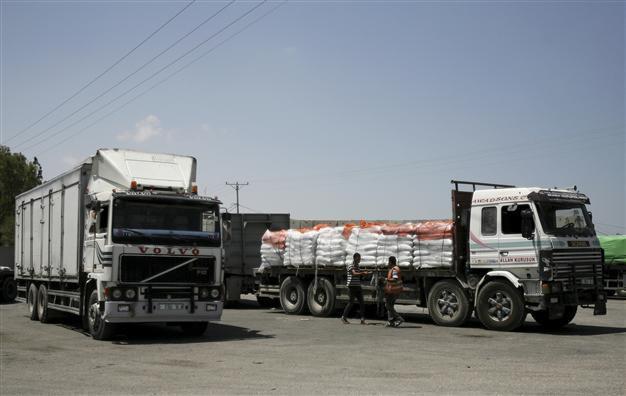Aid flows into Gaza after Israel-Hamas truce
GAZA CITY - Agence France-Presse

Palestinian workers check a truck, right, loaded with aid at the Kerem Shalom border crossing on its way from Israel to Rafah in the southern Gaza Strip, Wednesday, Aug. 27, 2014. AP Photo
Vital humanitarian aid was arriving in Gaza Thursday as residents began rebuilding their lives following a devastating 50-day war between Israel and Hamas that experts say left no winners.
Millions in and around the war-torn coastal enclave were enjoying a second day of peace after the guns fell silent following a permanent ceasefire agreement, allowing people to begin putting their lives back together.
The truce, which went into force on Tuesday evening, saw the warring sides agree to a "permanent" halt to seven weeks of bloodshed in a move hailed by Washington, the United Nations and top world diplomats.
Under the deal, Israel agreed to immediately lift restrictions on fishing, allowing boats to work up to six nautical miles from the shore in a move which went into effect early on Wednesday.
It also pledged to ease restrictions at the two crossings into Gaza, Erez and Kerem Shalom, to allow the entry of goods, humanitarian aid and construction materials, in a move which began Thursday.
Debate on crunch issues such as Hamas's demand for a port and an airport, and the release of prisoners, as well as Israel's calls to demilitarise Gaza have been postponed for another month until the sides resume talks in Cairo.
For now, the focus is catering for the immediate needs of the 1.8 million residents of the Gaza Strip, nearly half a million of whom were forced to flee their homes because of the fighting.
At the Kerem Shalom commercial crossing, a steady trickle of lorries were arriving early in the day, most carrying commercial goods, although some were transporting aid, bearing the logo of the UN agency for Palestinian refugees (UNRWA).
"During the war we used to come and go, but we were all bringing aid," said a lorry driver called Abu Amer.
"Now I'm bringing goods for the shops in Gaza," he told AFP as he watched his lorry full of nappies being inspected.
Other lorries were carrying furniture, fruits, and non-perishable foodstuffs, as well as what looked like water tanks. But there was no sign of any construction materials being brought in.
On Wednesday, more than 200 tonnes of aid from Saudi Arabia, Oman and Turkey trundled into Gaza from Egypt, entering via the Rafah border crossing, an official at the frontier told AFP.
A World Food Programme (WFP) aid convoy arrived in Gaza for the first time since 2007, also crossing from Egypt, and carrying enough food to last 150,000 people for five days, the Geneva-based agency said.
Another line of trucks took in 150 tonnes of medicine and medical equipment from Saudi Arabia, and 45 tonnes of health supplies arrived from an Oman welfare organisation. Turkey also sent humanitarian aid, officials said.
Palestinian officials were expected to meet their Israeli counterparts on Thursday to discuss procedures at the crossings, Raed Fattuh, head of the Palestinian liaison committee told AFP on Wednesday.
He said both Erez and Kerem Shalom would resume normal operations on Thursday in line with the norms that existed before the crisis began, with the sides to discuss the new procedures which are to be introduced as a result of the truce.
Both Israel and the Islamist Hamas movement, the de facto authority in Gaza, hailed the ceasefire as a victory.
Israeli Prime Minister Benjamin Netanyahu said Hamas had laid down very clear conditions for halting its fire - but had not managed to get any of its demands.
"Hamas wanted a port and airport in Gaza, the liberation of Palestinian prisoners, the mediation of Qatar and Turkey and the payment of salaries for its employees," he said late on Wednesday. "It got nothing."
Ahead of a new round of talks in Cairo, at which such issues are to be debated, Israel was taking a firm stance.
"There will be no port, no airport and no entry of materials that could be used to produce rockets or build tunnels," said deputy foreign minister Tzahi Hanegbi, a close Netanyahu associate.
"That will be our position which we will present at the negotiations in Cairo."
Israel has consistently linked Gaza's crucial reconstruction with its demilitarisation, with Netanyahu saying the rebuilding would go ahead - "but only under our control".
Hamas too claimed victory, saying it had "stood firm in the face of the arsenal of Zionist terrorism" and had caused Israel heavy losses -- a reference to the 64 soldiers killed in the fighting in Israel's biggest military toll since 2006.
